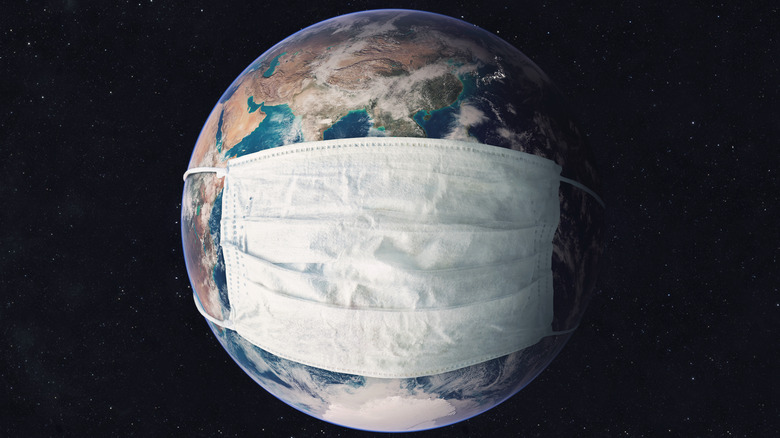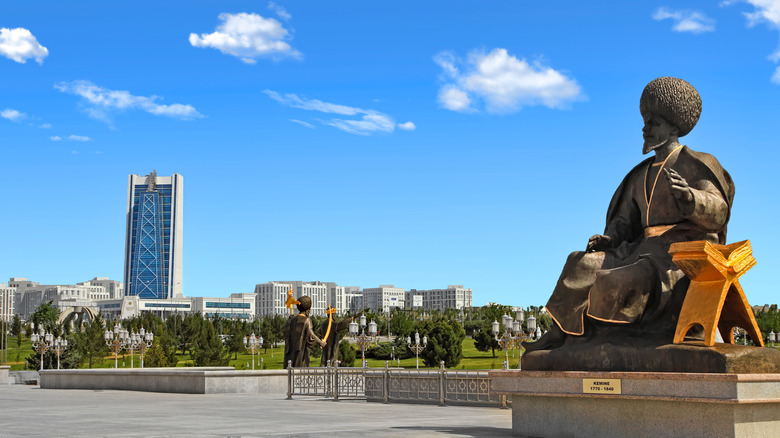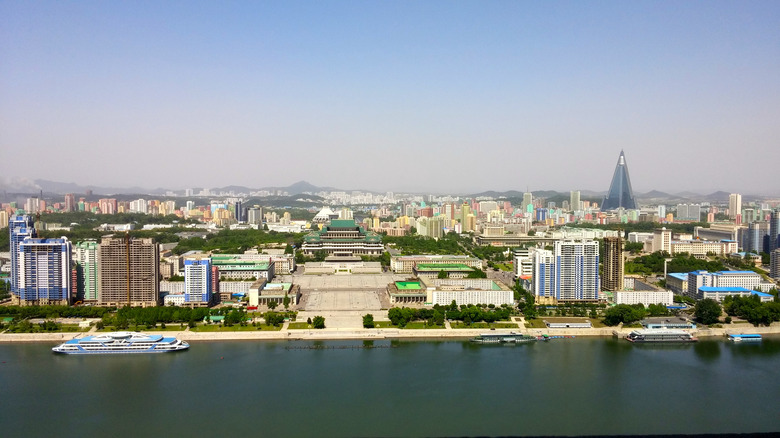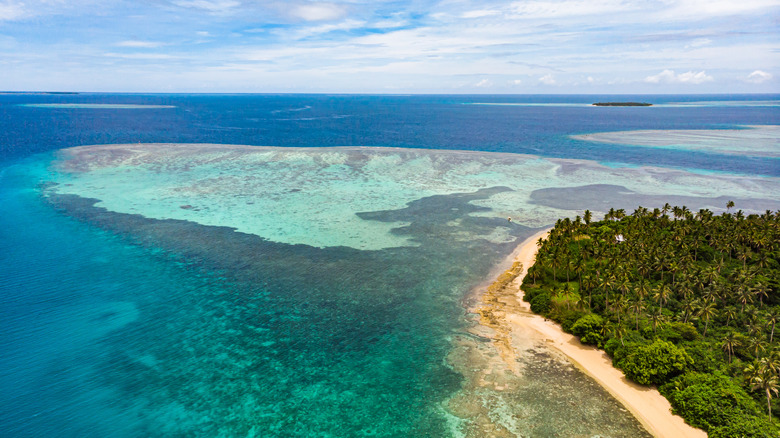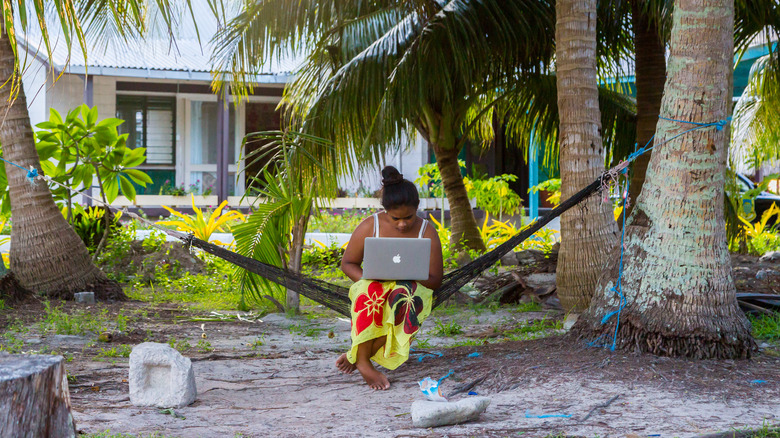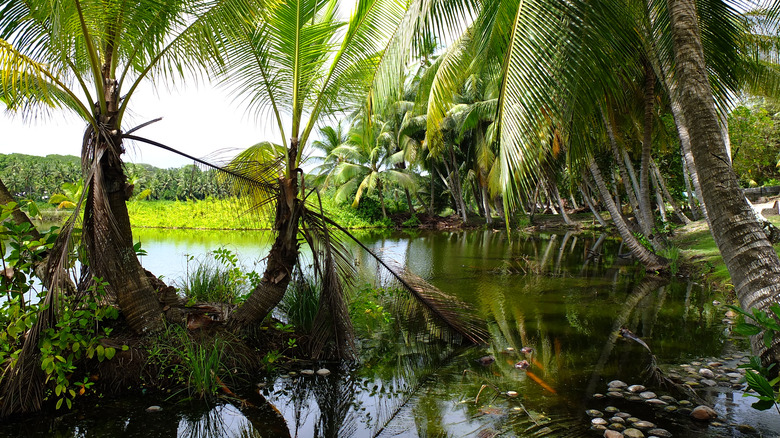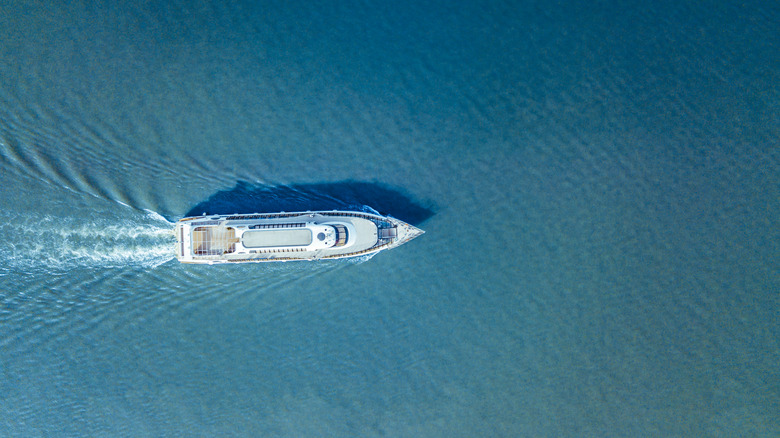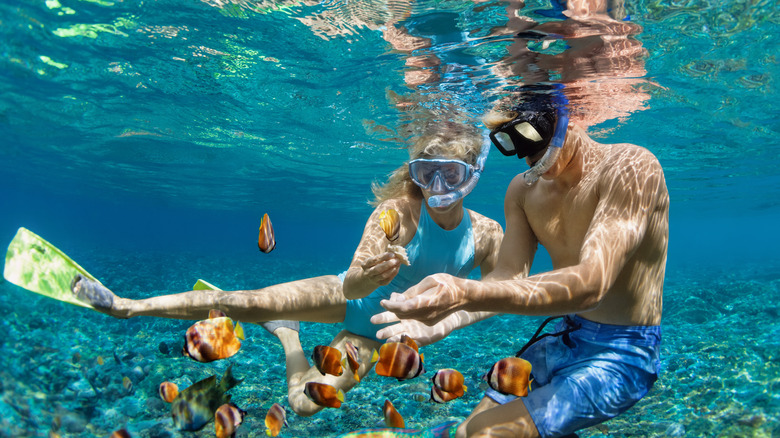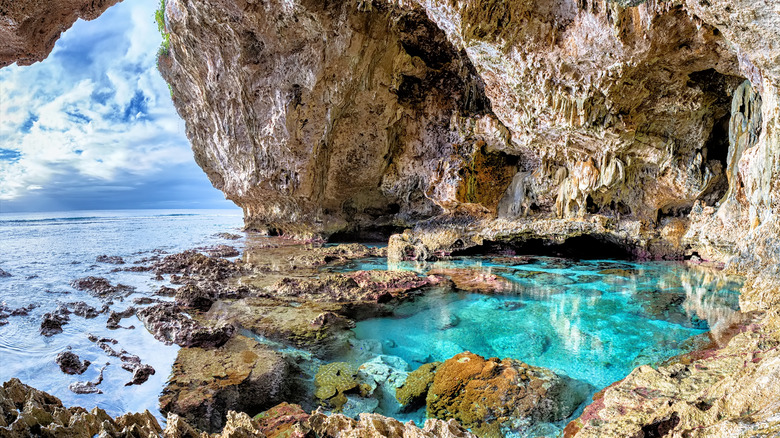These Are A Few Places Left Without Reported COVID-19 Cases
The pandemic has been an epochal jolt to the system. Sudden and seismic, its effects have rippled across the globe, uprooting businesses, burdening healthcare systems, and bringing countries to a standstill in a short span of time.
From the United States to India and Brazil, numerous countries have seen their cases of COVID-19 soar since the onset of the pandemic (via Reuters). A few Southeast Asian nations like Thailand and Vietnam were able to contain the virus throughout much of 2020 but experienced a sharp increase in outbreaks in 2021, according to Medical News Today. And with the addition of variants — several of which are more transmissible, according to data published in August 2021 — many countries continue to struggle amid new waves of infections.
For many of us caught in the maelstrom, it can be hard to imagine anywhere on earth that's gone unscathed by the effects of COVID-19, which has affected hundreds of millions of people worldwide (via Statista). But there are a few places left in the world with no reported cases of coronavirus. Unsurprisingly, a common denominator for these destinations is that they sealed their borders early, having maintained a ban on tourism ever since (via U.S. News & World Report). Though, it's important to note the possibility that some cases may go unreported or undetected, according to analysts. As of this writing, these countries and territories are reporting zero cases of coronavirus.
Turkmenistan
The Central Asian country Turkmenistan is yet to face the wrath of coronavirus. But the veracity of its claims has been called into question by some analysts, according to U.S. News & World Report. The second-largest state in the region is bordered by five countries, all of which have reported cases of COVID-19 (via The Diplomat). This has led some international media outlets to suggest that the virus may have crossed over at some point but reporting of it is likely being censored by authorities, revealed Australian Broadcasting Corporation.
Being relatively cut off from the world, Turkmenistan is seldom reported on in much depth by international media (via The Diplomat). According to BBC News, the country has a history of hiding facts and figures, having previously concealed the scope of the plague outbreak in the aughts.
Turkmen health officials cite strict travel policies as the reason behind the country's success, per U.S News. Most land borders were closed and flights to numerous countries were canceled in early 2020. Life purportedly goes on as normal in Turkmenistan; however, people are required to wear masks and social distance by two meters (about 6.5 feet) in public spaces, according to U.S. News & World Report. And in July 2021, vaccinations became mandatory for all adult residents (via Reuters). Anyone arriving into the country must isolate at a quarantine station in the northeast for a max of 21 days (via Travel Bans).
North Korea
North Korea maintains its status as a coronavirus-free nation (via NK News). It was one of the first countries to close its borders in January 2020, per 38 North, and quickly implemented strict travel rules, banning tourism and restricting cross-border movement (via U.S. News & World Report). According to a World Health Organization representative, the government has been vigorously testing its residents and quarantining both foreigners and nationals arriving into the country (via Australian Broadcasting Corporation). North Korea's first suspected case of COVID-19 was reported in July 2020, which led to the shutting down of the city of Kaesong. It was believed that someone infected with the virus had illegally crossed the border from South Korea, though testing showed inconclusive results, bringing the country's case record back down to zero (via Reuters).
North Korea's claims of no detected cases have engendered skepticism from the international community, according to U.S. News. Health experts have predicted that given its close proximity to China, the country is likely to have had some positive COVID-19 cases. But it could be argued that self-isolating from the world has helped North Korea stave off the virus.
The secluded kingdom's border shutdown has further isolated an already remote nation (via The Conversation). This has been more economically devastating than the international sanctions placed on the country since 2006 due to its nuclear missile tests, resulting in a nationwide shortage of food and agricultural supplies.
Tonga
According to BBC News, Tonga is one of the few countries that's never been colonized – and one of the few places on the planet without coronavirus (via World Health Organization). Like other success stories in the South Pacific, the small island has enacted strict travel policies (via The Conversation). Tongan borders have been closed since March 2020, and foreigners are only allowed to leave on flights back to their own countries, as reported by Koryo Tours. These repatriation flights are limited to 60 passengers and arrivals are subject to a strict quarantine at a hotel monitored by police.
The Pacific Island region at large has dealt with a relatively small number of coronavirus cases compared to other parts of the world due to stringent curbs on "personal movement," explained Straits Times. While it's helped slow down — and in some countries prevent — the virus from spreading, it's come at a social and economic cost for a region that's historically relied heavily on tourism, per The Conversation.
Just because COVID-19 hasn't set foot on Tonga, it doesn't mean that its inhabitants are unaffected by the pandemic, Zoe Stephens, a British traveler who's been stranded on the island since 2020, told CNN Travel. Thousands of Tongans abroad have been separated from their families since the start of the pandemic, she noted, adding, "There's maybe one repatriation flight every couple of months." Stephens says that while she considers herself "lucky," she's felt helpless witnessing the world grappling with the virus from afar.
Tuvalu
Tuvalu hasn't reported a single case of coronavirus since the pandemic started (via World Health Organization). In spite of its coconut trees and crystal blue waters, it's often cited as one of the least visited countries in the world due to its far-flung geographical location, receiving an average of only 200 visitors annually (via Pacific Island Times). Situated in the Polynesian subregion of Oceania, the island is not the easiest to get to. It has a small population of just under 12,000, which may have contributed to preventing an outbreak (via Pacific Island Times).
Like a lot of the islands in the Pacific Ocean, Tuvalu's continued success in keeping the virus at bay has been mainly attributed to its stringent travel rules (via IOM Environmental Migration Portal). When the World Health Organization declared the pandemic in January 2020, the Tuvalu government established a specialized COVID-19 Health Taskforce. International arrivals were then restricted from entering in March. When neighboring Fiji confirmed its first case of COVID-19 in March, a State of Emergency was announced and borders were immediately sealed off, with a subsequent ban on incoming flights and fishing vessels.
The government has only allowed a few repatriation flights to occur due to lack of insufficient medical equipment and quarantine facilities according to the IOM Environmental Migration Portal. This has resulted in many Tuvalu citizens being stranded abroad, including students and sailors (via Toda Peace Institute). The few people who are able to return are required to undergo a 14-day quarantine upon arrival (via Crisis24).
Nauru
This oval-shaped island is one of several remote Pacific nations that has managed to keep the virus off its doorstep. With a population of 12,581, Nauru is the smallest independent country in the region (via Pacific Island Times). And despite being considered a paradise, it's one of the least-visited places in the world, with approximately 200 tourists per year, notes Koryo Tours.
Like other Pacific nations, it's likely to have benefited from bordering the ocean. It's also undertaken prompt measures to curb travel, which has meant that locals can now walk around the island without having to social distance or wear a face mask, reported Pacific Island Times. Nauru shut its borders in March 2020, but travelers were initially banned from high-risk countries, and in mid-March, flights from other destinations were also suspended including Fiji, Kiribati, and the Marshall Islands (via BBC News).
The government is currently only allowing "essential travel," and arrivals (mostly returning residents) must quarantine for 14 days before entry (via Crisis24). Individuals in quarantine are checked for symptoms daily, with further isolation and testing carried out where necessary, per BBC News. Nauru has a particularly frail healthcare system, with just one hospital, no ventilators, and a dearth of nurses, which could potentially have debilitating effects on patient care. In May 2021, the small nation became one of the first countries to immunize its entire adult population with the AstraZeneca vaccine (via Australian Broadcasting Corporation).
Tokelau
Tokelau is yet to face the coronavirus, according to World Health Organization. The tiny nation is a territory of New Zealand in the South Pacific Ocean, about 2,000 miles north of Auckland, and with a population of just 1,500 people (via The Guardian). The remote island is only reachable by boat from Samoa (via RNZ). And the pandemic has brought even greater isolation to this far-away destination.
In early 2020, there were two reported cases of COVID-19 in neighboring Samoa, which raised alarm among authorities in Tokelau, but the infected individuals were immediately placed into quarantine, preventing any further community transmissions, per RNZ. There are now several isolation centers set up across the island in preparation for any confirmed or suspected cases.
Tokelau is another island in the Pacific region with insufficient healthcare infrastructure, namely three doctors across its atolls and 36 nurses, explained The Guardian. The nation is very much dependent on its boats in the event of an outbreak, Kelihiano Kalolo, the leader of Tokelau's Atafu atoll, told RNZ, stressing that the pandemic has highlighted the importance of an airstrip in Tokelau in the near future. In July 2021, Tokelau's largest atoll, Nukunono, received over 700 doses of the Pfizer vaccine from New Zealand for its 346 eligible residents, per The Guardian.
Pitcairn Islands
The Pitcairn Islands is yet to end its run as a coronavirus-free destination. The British overseas territory, also known as British Polynesia, is nestled in the South Pacific, with a tiny population of just 47 residents (via Australian Broadcasting Corporation). Its natural isolation may have played a factor in its success. Pitcairn also made a quick decision to seal its borders and implement a travel ban in early 2020 so as to protect its elders, maintaining only a supply ship that travels to and from New Zealand. The self-sufficient island has set up a one-way "travel bubble" with New Zealand, allowing its inhabitants to take a two-week trip to access essential healthcare or visit family.
In May, the United Kingdom supplied the island with enough vaccine doses for the entire population, per ABC. As of August 2021, the nation is reported to have 86% of the population immunized. With no lockdowns or masks and the population mostly vaccinated, the fear faced by the rest of the world "just disappears," Mark Tomlinson, an expat living on the island, told the publication.
But like other countries that have managed to fend off the ominous presence of the virus, Pitcairn hasn't been entirely spared its effects (via The Conversation). The abrupt halt to tourism has put a dent in the island's economy, since the idyllic destination was attracting a large number of travelers before the global pandemic struck (via Scoop).
Niue
Niue is a self-governing territory of New Zealand — sometimes referred to as "the rock of Polynesia" (via Britannica). The small island nation has a population of just 1,639 inhabitants, according to Worldometer. Like several other states in the South Pacific Ocean, the government took fast action to stop almost all movement to and from the island in early 2020 as the coronavirus spilled rapidly across the globe (via The Guardian).
Having maintained stringent border controls and with 97% of its population vaccinated due to Pfizer donations, the picturesque coral atoll has become another destination that has established a one-way travel bubble agreement with New Zealand (via Stuff). This allows Niueans to travel to New Zealand without having to undergo the usual mandatory 14-day quarantine.
Foreigners are still restricted from entering the island with the exception of spouses or children of Niuean residents, though the government has continued to extend tourist visas for anyone who remains stranded on the island (via Crisis24). As with other Pacific populations, Niue's remoteness may have helped the nation doge the coronavirus bullet, but being evermore cut off from the world is likely to take a toll on its economy in the long run (via The Conversation).

